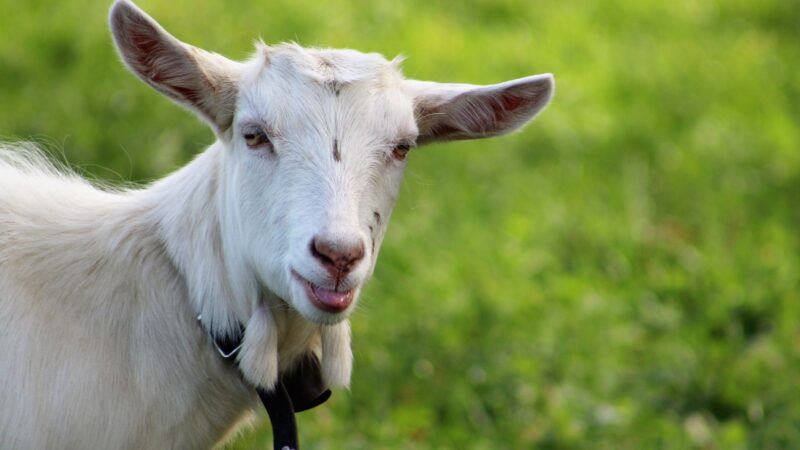The best way to deworm goats is to use a veterinarian-recommended, broad-spectrum anthelmintic (dewormer) that targets specific parasites affecting the herd, following appropriate dosing and treatment intervals.
In this article, we’ll go beyond the basics and dive into the world of goat deworming. We’ll discuss why it’s necessary, how to tell if your goat has worms, the best time to deworm, and more.

Do Goats Need Deworming?
Yes, goats need deworming. Worms and other parasites are a common issue in goats, and their infestation can lead to health issues like weight loss, anemia, and even death. Regular deworming ensures that your goat remains healthy and productive.
How Do You Tell if a Goat Has Worms?
A goat with worms may show signs such as diarrhea, weight loss, dull hair coat, and anemia (pale inner eyelids). A definitive diagnosis can be made by conducting a fecal egg count test with the help of a veterinarian.
What Is the Best Time to Deworm Goats?
The best time to deworm goats is during the spring and fall seasons when parasite populations are at their highest. However, the ideal deworming schedule may vary depending on your herd’s specific needs and your local climate.
How Often Should You Worm a Goat?
Deworming frequency depends on factors like the goat’s age, immune status, and pasture conditions. In general, adult goats should be dewormed every 3-4 months, while kids may require more frequent treatments.
How Long Does Goat Dewormer Take To Work?
A goat dewormer typically starts working within 24 hours, with most worms being expelled within 48 hours. However, the effectiveness of a dewormer can depend on factors such as the type of wormer used and the worm species targeted.
When Do You Deworm Baby Goats
Baby goats should be dewormed for the first time between 8-12 weeks of age, followed by additional treatments as recommended by your veterinarian.
Can You Deworm a Pregnant Goat?
When to Deworm Pregnant Goats?
Deworming pregnant goats is essential for their health and the health of their unborn kids. Ideally, pregnant goats should be dewormed 2-4 weeks before their due date.
Is a Safeguard Dewormer Safe for Pregnant Goats?
Yes, Safeguard (fenbendazole) is safe for pregnant goats when used according to the manufacturer’s instructions.
Can You Deworm a Nursing Goat?

Yes, you can deworm a nursing goat. However, consult your veterinarian for the best dewormer choice and appropriate dosing recommendations.
How Do You Deworm a Goat Naturally?
Some natural deworming options include using herbs like wormwood, garlic, and diatomaceous earth. However, their effectiveness varies and may not be as reliable as commercial dewormers. Always consult with your veterinarian before using natural remedies.
What Is the Best Goat Wormer?
The best goat wormer is one that effectively targets the specific parasites in your herd. Consult with your veterinarian to determine the most appropriate wormer based on fecal egg count results and your herd’s needs.
How Often Do Goats Need Cdt Shots?
Goats need CDT (Clostridium perfringens types C and D and tetanus) shots annually. Kids should receive their first CDT shot at 6-8 weeks of age, followed by a booster 3-4 weeks later. Adult goats should receive a booster shot once a year.
Should I Vaccinate My Goats?
What Size Needles for Goats?
For vaccinating goats, use a 20-22 gauge needle, with a length of 1 to 1.5 inches, depending on the size and age of the goat.
What Kind of Vaccines Do Goats Need?
Goats should receive vaccinations for Clostridium perfringens types C and D and tetanus (CDT). Consult your veterinarian for other vaccines based on your herd’s specific needs and your local disease risks.

Can You Overdose a Goat on Wormer?
Yes, overdosing a goat on wormer can lead to toxicity and even death. Always follow the manufacturer’s instructions and consult your veterinarian for proper dosing recommendations.
How Do I Give Cdt to Goats?
CDT shots are given subcutaneously (under the skin). To administer, lift the skin on the goat’s neck, insert the needle at a 45-degree angle, and inject the vaccine.
What Does Cdt Shot Do for Goats?
CDT shots protect goats against Clostridium perfringens types C and D, which cause enterotoxemia (overeating disease), and tetanus, a severe and often fatal neurological disease.
How Do You Prevent Coccidia in Goats?
To prevent coccidia in goats, practice good hygiene, avoid overcrowding, provide clean and dry bedding, and ensure access to clean water. Consult your veterinarian for additional preventive measures, such as using coccidiostats in feed.
Related: Zinc Deficiency in Goats | Overlooked Symptoms and Reliable Remedies
Where Do You Give Goats Cdt Shots?
CDT shots are given subcutaneously in the loose skin behind the shoulder or in the neck area.
Can Dewormer Cause Diarrhea in Goats?
Yes, dewormer can cause diarrhea in goats as a side effect, especially if the animal has a heavy worm burden. If diarrhea persists, consult your veterinarian.
Related: Constipation in Goats | Proven Relief and Prevention Techniques!
Related Questions

Can Humans Take Goat Dewormer?
No, humans should not take goat dewormer. Human medications should only be used under the guidance of a healthcare professional.
Can You Use Safeguard Goat Dewormer on Dogs?
Yes, Safeguard (fenbendazole) can be used on dogs following a veterinarian’s recommendations for the appropriate dosing and duration.
Can You Use Safeguard Goat Dewormer on Cats?
Yes, Safeguard (fenbendazole) can be used on cats following a veterinarian’s recommendations for the appropriate dosing and duration.
Can You Use a Goat Dewormer for Sheep?
Many goat dewormers can be used for sheep, but dosing and frequency may vary. Consult your veterinarian for proper usage and dosing guidelines.
Does Positive Pellet Goat Dewormer Work?
Positive Pellet Goat Dewormer is an all-natural dewormer that some goat owners have found effective. However, its effectiveness may vary, and it is not a substitute for a veterinarian-recommended dewormer.
Final Thoughts
Deworming and proper vaccinations are essential to maintaining a healthy and productive goat herd. Consult with your veterinarian to develop a tailored deworming and vaccination schedule based on your herd’s needs and local disease risks. Remember, a healthy goat is a happy goat!
